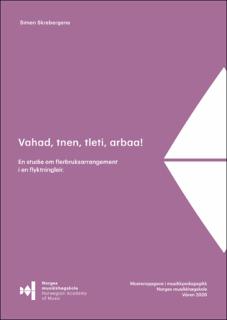Vahad, tnen, tleti, arbaa! En studie om flerbruksarrangement i en flyktningleir.
Master thesis
Permanent lenke
https://hdl.handle.net/11250/2687071Utgivelsesdato
2020Metadata
Vis full innførselSamlinger
- Masteroppgaver [283]
Sammendrag
Sammendrag -
Denne masteroppgaven utforsker undervisningskonseptet flerbruksarrangement og hvordan dette brukes musikkaktiviteter i en flyktningleir. Flerbruksarrangement har blitt brukt som arbeidsform og videreutviklet i forbindelse med Norges musikkhøgskoles musikkaktivitet i Libanonprosjektet som finner sted i flyktningleiren Rashedieh i Sør-Libanon hvor konseptet brukes som en sentral del av undervisningen. Formålet til masterarbeidet er å få innsikt i og utvikle kunnskap om flerbruksarrangement, musikkaktiviteten i flyktningleiren og hvordan disse påvirker hverandre.
Empirien i oppgaven er samlet gjennom fire opphold i Libanon og flyktningleiren Rashedieh i tidsrommet 2018-2019. Dataene er samlet inn med en etnografisk tilnærming hvor deltakende observasjon og semi-strukturerte intervjuer stod sentralt.
Resultatene og diskusjonen etter skaper sammenhenger mellom community music, didaktisk teori og sosiokulturell læringsteori. Funnene fra arbeidet tyder på at flerbruksarrangement som arbeidsform lykkes med sin hensikt om inkludering på grunn av sin tilpasningsdyktighet til hver enkelt deltaker, enten det er gjennom tilpasning av enkelte samspillstemmer eller musikklek. For å oppnå dette viser funnene at det foregår et samarbeid mellom ulike lærerkrefter i musikkaktiviteten, som inkluderer både de voksne lærerne og deltakere som midlertidige lærerkrefter. Resultatene viser også at det kreves mye av den som leder et flerbruksarrangement da han eller hun blant annet kan måtte trenge musikalske ferdigheter som improvisasjon, komponering, arrangering og gehørspill samt ferdigheter innen instruering, planlegging og lederskap. Summary -
This master thesis explores the teaching concept of flerbruksarrangement, also called multifunctions- score, and how this is used in music activities in a refugee camp. Multi-functionsscore has been used as a method of teaching and been further developed in connection with the music activity of the Norwegian Academy of Music in the Lebanon project, which takes place in the refugee camp Rashedieh in southern Lebanon where the concept is used as a central part of the teaching. The purpose of the master's thesis is to gain insight into, and develop knowledge about multi-functions-scores, the music activity in the refugee camp and how they influence each other.
The data in the thesis is gathered through four trips to Lebanon and the refugee camp Rashedieh during the period 2018-2019. The data were collected using an ethnographic approach where participant observation and semi-structured interviews were central.
The results and the discussion following create connections between community music,didactic theory and sociocultural learning theory. The findings from the work suggest that multi-functions-score as a teaching method succeed with its intention of inclusion because of its adaptability to each participant, whether through the adaptation of individual musical voices or music games. To achieve this, the findings show that there is a collaboration between different teachers in the music activity, which includes both the adult teachers and participants as temporary teachers. The results also show that there is required many skills of the person leading a multi-functions-score, as he or she may, among other things, need musical skills such as improvisation, composing, arranging and hearing games as well as instruction, planning and leadership skills.
Beskrivelse
Norges musikkhøgskole. Masteroppgave. Musikkpedagogikk
